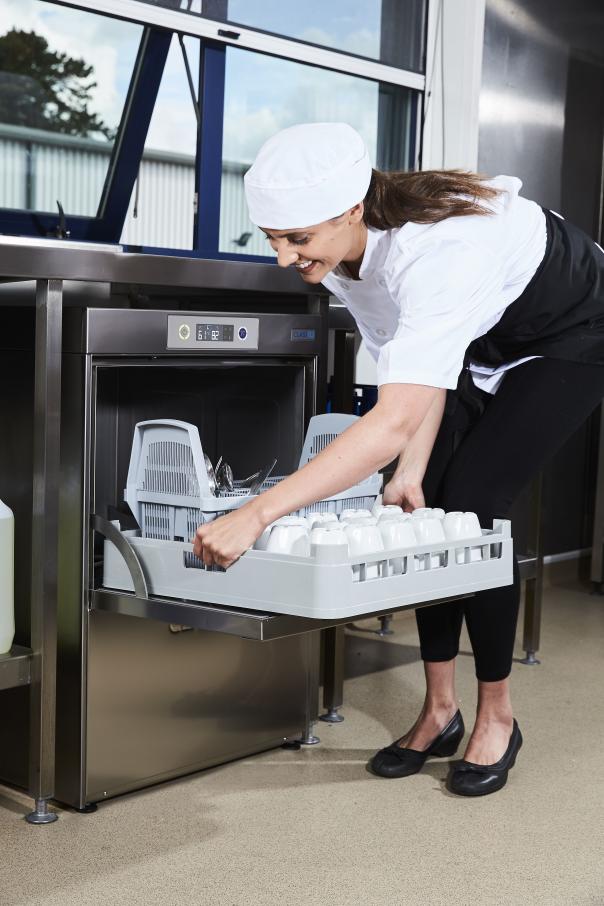
Connectivity is a term one might associate more with telecomms than warewashers, but it is very much part of the offer as far as Paul Crowley, marketing development manager of Winterhalter UK, is concerned.
“Connected appliances will bring a whole new and different type of efficiency to kitchens,” he says. “Operation managers will be able to monitor equipment like never before and will be able gain efficiencies because of the power of the data at their fingertips.
“These will be efficiencies like reduced downtime through identifying products or components that are be about to fail.”
Crowley says Winterhalter’s new Connected Wash system exploits the latest networking and digital technologies to make warewashing more efficient, reliable and controllable.
“It allows our warewashers to be networked to provide more continuity and efficiency in the kitchen – or in multiple kitchens,” he explains. “The system keeps Winterhalter warewashers working at optimum efficiency as it lets operators know when anything goes wrong.”
Crowley adds that automation, across the board, is making caterers’ lives easier. For Winterhalter that has meant the introduction of software-driven products, such as machines that can be adapted to precise on-site conditions, ones that can automatically adjust their pressure depending on what’s being washed, and units that will automatically replenish water when they sense it is too dirty.
“Many warewashers can also notify users if they detect basic errors, reducing costly downtime,” says Crowley.
“Our UC Excellence-iPlus under-counter warewasher features hybrid technology that saves water, and an integral reverse osmosis (RO) system that removes almost 100% of water impurities.
“Alongside the RO system is an integral water softener offering a variety of benefits, including preventing blockages of the RO membrane.”
Roger Kellow, government account manager for warewashers at Hobart UK, advises: “The cost sector has always been an important part of our business mix and forms an increasing focus as the sector – mirroring foodservice as a whole – continues to grow.
“Just as there are increasingly high expectations from catering equipment customers in the pubs, restaurants and hotels of the profit sector, the care sector is no less demanding of its suppliers and manufacturers.
“Those who underestimate its importance from a business perspective will, inevitably, fail to prosper from its continued expansion.”
Kellow says that while the demands of service users directly reflect the changes and evolution that is present in the wider hospitality industry, a more stringent focus on food safety and hygiene, brought about by the need to sometimes cater for more vulnerable members of society, sets the sector apart.
“It is imperative, therefore,” he says, “that catering equipment meets these unique demands head-on, whether it’s through the temperature of the cooked or served food or the provision of properly sanitised plates.”
While price sensitivity still exists, says Kellow, one key trend Hobart has seen developing is an even greater focus from operators on the benefits of sustainability and energy efficiency as well as the importance of good after-sales support and robust training.
“These factors are now allied to the more traditional demands of simple longevity and reliability, resulting in a purchasing environment that yet again mirrors shifts in the wider hospitality industry,” says Kellow.
One of the best ways to find out about advances in warewashing is to take advantage of the free site surveys that manufacturers offer, says Paul Anderson, managing director of Meiko UK.
“And don’t neglect visits to existing users of that kit, which will provide you with feedback on the performance of recent equipment innovations such as integral RO and heat recovery,” he adds.
Meiko’s new UPster series H500 offers a feature that directs steam away from the operator, while both hood and body are double-walled to conserve energy and heat as standard.
And the soon-to-be-launched M-iClean H hood type warewasher allows users automatic operation, a novel eye-level control panel designed to be easier for operators to access, read and use [CHK].
From Comenda, for which Hubbard Systems is now the exclusive distributor in the UK, there is the new range of AC2E dishwashers.
Suited to all catering premises, big or small, the new series can wash up to 220 racks an hour. Each dishwasher consists of individual modules that can be assembled according to the customer’s productivity requirements and the space available.
In assessing what is most important to operators across contract catering sites when it comes to washing glasses and general crockery, Adam Lenton, marketing manager of British-made Classeq warewashers, says: “They want reliability, effective results and fast throughput to keep pace with footfall during busy service periods.”
He says that the company’s “Duo (under-counter) range, for example, has been engineered to give operators information that is easily accessed and displayed”.
“The machines not only come equipped with an LCD digital display to show temperatures accurately but also offer a variety of cycle options (standard and superfast), to match each site’s requirements.”
Both Smeg and Miele are making inroads on the commercial warewash market. For example, Smeg has glasswashers, front-loading dishwashers and hood-type dishwashers, boasting atmospheric boilers and rinse pumps plus energy-saving devices such as heat recovery from drain water and/or steam condensate systems.
Miele offers under-counter and hood-type machines and ‘deep’ models for trays and larger items along with short wash and dry cycles. Miele glasswashers, tagged Perfect GlassCare, feature integrated RO technology.
At Electrolux serious attention is being paid to water quality. Steve Bowler, category manager for warewashing at Electrolux Professional UK, says: “It is really important to consider the type of water you will be washing in, with hard water supplied to around 60% of the UK.”
He says Electrolux warewashers are available with two features that equip them to operate using hard water: “The first is a built-in internal softener, which treats the water before it enters the machine and prevents the build-up of scale on the machine’s internal components. The second is our automatic de-lime cycle.”